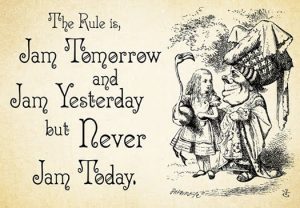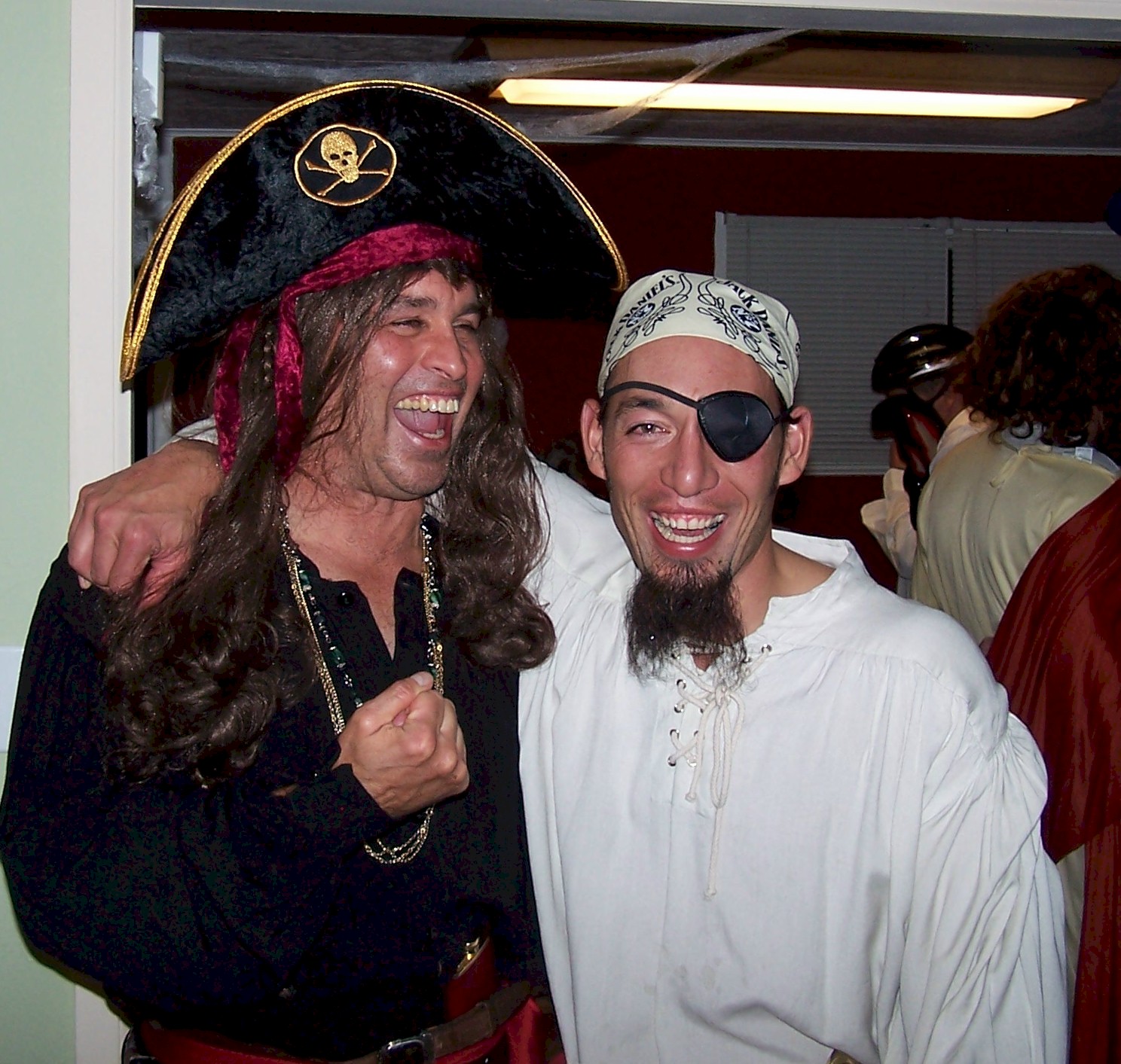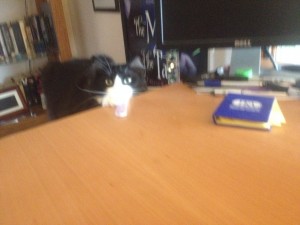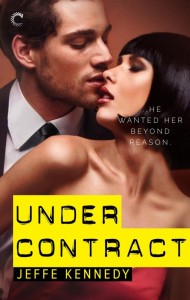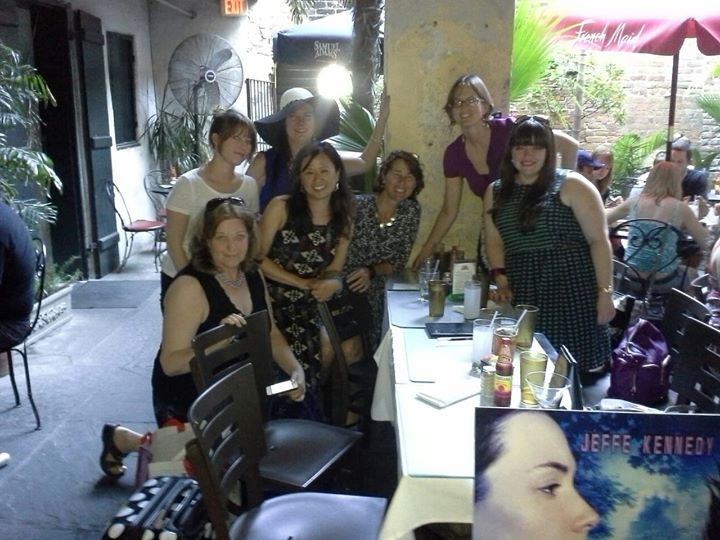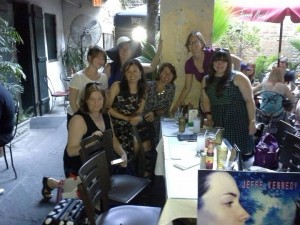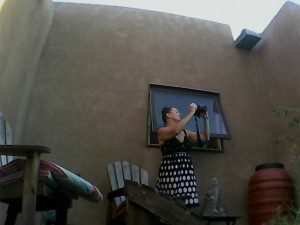 David got this pic of me, without my knowledge, with a video surveillance camera he was playing with. Which is why the colors are so stark. Always interesting to see a view of myself when my attention is totally on something totally other than being photographed – in this case, on getting the photograph *I* wanted.
David got this pic of me, without my knowledge, with a video surveillance camera he was playing with. Which is why the colors are so stark. Always interesting to see a view of myself when my attention is totally on something totally other than being photographed – in this case, on getting the photograph *I* wanted.
I want to tell you all a story. I think I’ve referenced it before, but I’m pretty sure I’ve never told the whole thing. I’ver written it in my head enough times that I’m not sure, however. It starts with 8th Grade.
See, I had English as the last class of the day, every day. I had kind of a love/hate relationship with English class in general, especially in middle school. On the one hand, I got to READ, for school, even! And I loved to write. Both were very easy for me, so much so that I almost held them in contempt. Surely something so easy wasn’t worthwhile. Also, while my math and science teachers gave me accelerated assignments to work on, to keep me interested, there wasn’t anything like that in English. I was bored a lot of the time. And, because I was 13, I didn’t have the sense or poise to disguise that fact. I also had started menstruating when I was 12 and I was full of sexual feelings. Feelings for which I had little outlet, beyond masturbation and illicit reading. It did come out in the poems I had to write for English class, probably much more so that I realized. I don’t think my stuff was at all graphic – I mean, we had to read them out loud – but it was full of sensual language. I know because I kept a list of “good words,” many of which I still use today in writing erotic scenes. I also had all kinds of adolescent sexual energy behind what I wrote.
Looking back, at the fact that I’ve become a writer, not a scientist, this all makes perfect sense. But I didn’t understand it at the time. Also, being a 13-year-old girl, I had zero idea how to handle boys.
There was a group of boys in that class – four or five of them that were friends, all football players. I remember two clearly. One I’ll call John, a gentle guy who I had a bit of a crush on, and the other was a guy I’ll call Doug Smith. Now, Doug was quite the star. Athlete, tall, dark hair – all the girls liked him. He was the leader of this little group. And for whatever reason, they fixed on me. This all goes back to the thing of “when boys like a girl, they tease her.” Well, they did more than tease. Every day after class ended, they would follow me out of class and grab my ass.
This is one of those montage things. It felt like it went on forever. It felt like they all tried to grab me, put their hands between my legs. Doug Smith did the most. I tried various tactics. Waiting to talk to the teacher, leaving class really fast. If I managed to evade them, their laughter would follow me.
No, I never told anybody about it. Not even my friends.
If my mom is reading this, she’s probably all upset that I never told her.
Why didn’t I? I don’t know. It was that shame thing. I didn’t understand why they were doing it, only that I felt terrible and wanted them to stop. I didn’t want anyone else to know about it because that would only make it worse, for people to know.
And that’s not even the relevant part of the story. It came to an end, probably because we graduated 8th grade or they moved on to some other target. I think I got better at fighting it – I kicked one of them once, pretty hard. I even rode rides at the amusement park for 8th grade graduation with my crush John, though that never went anywhere. Doug Smith went on to be the high school superstar in many ways and I fell out of his orbit of notice, thankfully.
The weird part of this story is that, about a year or so ago, Doug Smith sent me a Facebook friend request.
Right? Like a bolt from the blue. And all those awful feelings rushed back, though I have the maturity now know to process them and know them for what they were. So, turns out Doug is an artist these days. As a career. After sitting on the request, and mentioning the history obliquely to a few friends, I finally accepted the request. I kind of wanted to see what he’s about, these three decades later. He’s very chipper on Facebook – about both his art and my writing. He sometimes comments about my various successes and invites me to attend his shows.
He’s working the social media, you know?
And I find myself wondering – does he remember what he and his pack did to me? Maybe they thought nothing of it. I might have been some pretty girl they thought they were flirting with. When I read stories about people confronting their childhood bullies as adults, it seems that a lot of the time the bully had no concept of their impact. Mostly I try to reconcile this very macho, dick-swinging, callous teen with who appears to be a thoughtful and sensitive artist today. I sometimes wonder if he’s gay and out now, and that all that meanness and sexually related cruelty came from his struggles with that.
I don’t have an answer to any of it. Probably there are none. I think mostly I’m mulling this idea I have that a person who’s an artist can’t also be cruel, which I think is wrong. I also believe people can change and obviously that was a long time ago. I’m not the girl I was then. He’s clearly not the guy he was.
But I’ve never replied to him on Facebook. I just watch, and think about this.
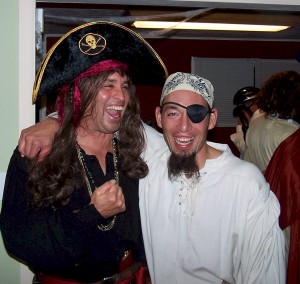 One thing I’ve noticed recently, in sifting through the spam comments on my blog, is how many come from Russians now. And on one post, in particular.
One thing I’ve noticed recently, in sifting through the spam comments on my blog, is how many come from Russians now. And on one post, in particular.